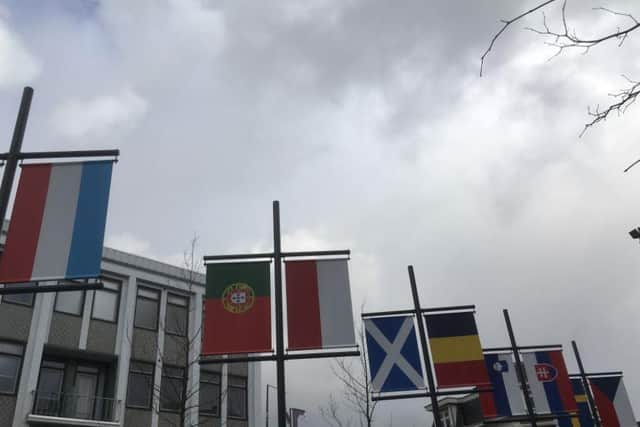Why is there a Scottish Saltire hanging in the Dutch city of Leeuwarden?
The man responsible is the alderman for arts and culture Sjoerd Feitsma, who aimed to reach out to Scotlands' remain voters.
He tweeted: “On Brexit day, the Scottish flag is prominently (and permanently) visible at the Central station in @Leeuwarden. We'll leave a light on”.
A trip to Scotland


Advertisement
Hide AdAdvertisement
Hide AdThis well-received gesture was born during Fietsma’s Edinburgh visit earlier this year just days before the UK left the European Union. He said: “I was told that officials were sad to take down the EU flag from the parliament in Holyrood. Knowing that the flags at the station in Leeuwarden had to be replaced the following week, I made some calls. When I returned all had been arranged”.
Feitsma was clear in his intention to maintain close partnerships with Scotland and other UK cities “no matter what Brexit brings”.
Although spontaneous, his idea had a serious undertone, as he explained: “we want to keep cooperating with the UK cities in arts and cultures”.
The Northern city of Leeuwarden has close cultural ties with Edinburgh through the EU Creative Europe; which supports setting up co-operations within art and culture throughout
Europe, and is a network that offers funding for a range of creative activities ranging from visual arts projects to literature festivals.
Funding worries
So far, UK creatives have benefited from £1.8 million in funding, allowing UK artists to collaborate with EU projects from countries such as the Netherlands, Belgium, and
Norway.
The alderman worries what will happen to EU-UK project collaborations in the case of a no- deal scenario.
One of the reasons for hanging up the flag was to respond to the “enormous demand” from people working in arts and culture to maintain a healthy and well-connected relationship
between the UK and the continent.
Advertisement
Hide AdAdvertisement
Hide AdHe and colleagues are trying to maintain ties with the UK cities in order to not lose out on projects like ‘Love letters to Europe’ where ten Scottish writers and artists project ‘love letters’ to the European mainland on buildings. This year Dutch writers are to respond with a letter of their own.
He said: “The fact that the UK chooses to leave is their choice, fine, we cannot do anything about it. But I will do everything to ensure we can continue to co-operate via arts and culture, to ensure that theatre-makers and performers can cross borders with minimal hassle."
Yet what “minimal hassle” will entail remains to be seen, and largely depends on the type of deal UK will be facing at the end of 2020.
He also backs the Dutch government’s stance in supporting UK citizens who have built a life in the Netherlands, and encourages them to continue living, working and benefiting from
social welfare “whether Dutch or not”.
Feitsma describes the UK as “more progressive open and multi-cultural” than the Netherlands regarding an array of social issues. And deems the decision to exit the EU as “bizarre”. He
believes Brexiteers will be disappointed when they realize their industries are “not in Germany but china and are not coming back any time soon.”
His solidarity with the 62% Scottish majority that voted remain reflects that of the majority of the Netherlands. In January 2019, The Dutch government sent out a letter to the approximately 45,000 UK nationals living in the Netherlands granting them a guaranteed stay of at least 15 months in the case of a no-deal Brexit.
What will happen to the 40,000 Dutch citizens in the UK remains unclear and according to Fietsma; many who have settled and established lives in the UK have now come back to the Netherlands.